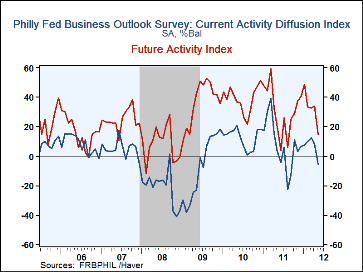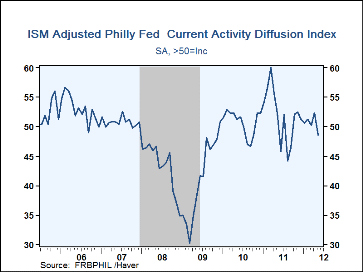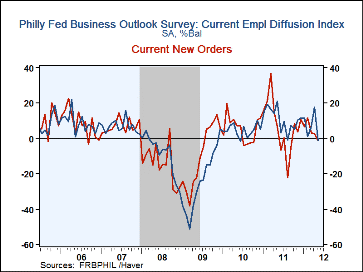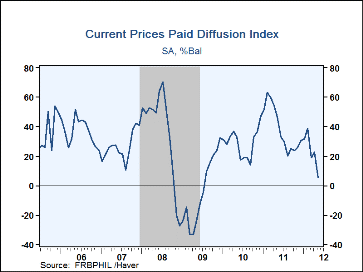 Global| May 17 2012
Global| May 17 2012Philadelphia Fed Activity Index Unexpectedly Turns Negative
by:Tom Moeller
|in:Economy in Brief
Summary
The Philadelphia Federal Reserve Bank's General Business Conditions Index fell sharply this month and into negative territory. The decline to -5.8 for May from an unrevised 8.5 compared to an expected gain to 10.3. The figure was the [...]
The Philadelphia Federal Reserve Bank's General Business Conditions Index fell sharply this month and into negative territory. The decline to -5.8 for May from an unrevised 8.5 compared to an expected gain to 10.3. The figure was the first negative since September of last year. Haver Analytics constructs a seasonally adjusted figure comparable to the ISM index and it fell to a below break-even of 48.6.
Declines in the component series were widespread last month including drops in new orders, unfilled orders, delivery times, inventories and employment. The latter's negative 1.3 was the first below zero since June 2010. During the last ten years there has been an 83% correlation between the employment figure and the m/m change in factory payrolls.
The prices paid index also fell sharply to 5.0 from 22.5. This latest reading was the lowest since July 2009. During the last ten years there has been a 70% correlation between the prices paid index and the three-month growth in the intermediate goods PPI.
The separate index of expected business conditions in six months also fell sharply to its lowest since August. The decline was led by inventories and employment as well as shipments and new orders. The prices paid series improved.
The survey panel consists of 150 manufacturing companies in Federal Reserve District III (consisting of southeastern PA, southern NJ and Delaware.) The diffusion indexes represent the percentage of respondents indicating an increase minus the percentage indicating a decrease in activity. The figures from the Philadelphia Federal Reserve can be found in Haver's SURVEYS database. The Consensus expectations figure is available in AS1REPNA.
Accounting for the Non-Employment of U.S. Men, 1968-2010 from the Federal Reserve Bank of Richmond is available here.
| Philadelphia Fed (%) | May | Apr | Mar | May'11 | 2011 | 2010 | 2009 |
|---|---|---|---|---|---|---|---|
| ISM-Adjusted General Business Conditions | 48.6 | 52.4 | 50.3 | 52.4 | 51.9 | 50.7 | 41.2 |
| General Business Conditions | -5.8 | 8.5 | 12.5 | 3.2 | 7.7 | 12.1 | -7.6 |
| New Orders | -1.2 | 2.7 | 3.3 | 6.6 | 7.1 | 5.5 | -9.5 |
| Shipments | 3.5 | 2.8 | 3.5 | 6.3 | 9.9 | 8.3 | -7.9 |
| Unfilled Orders | -9.4 | 3.2 | -11.0 | -5.7 | -0.9 | -3.0 | -15.2 |
| Delivery Time | -14.0 | -3.4 | -7.1 | -2.0 | -0.4 | 0.9 | -15.2 |
| Inventories | 4.5 | 8.2 | 0.9 | -4.1 | -0.4 | -5.0 | -24.0 |
| Number of Employees | -1.3 | 17.9 | 6.8 | 21.1 | 11.0 | 4.6 | -23.8 |
| Prices Paid | 5.0 | 22.5 | 18.7 | 46.4 | 38.6 | 28.8 | -3.6 |
Tom Moeller
AuthorMore in Author Profile »Prior to joining Haver Analytics in 2000, Mr. Moeller worked as the Economist at Chancellor Capital Management from 1985 to 1999. There, he developed comprehensive economic forecasts and interpreted economic data for equity and fixed income portfolio managers. Also at Chancellor, Mr. Moeller worked as an equity analyst and was responsible for researching and rating companies in the economically sensitive automobile and housing industries for investment in Chancellor’s equity portfolio. Prior to joining Chancellor, Mr. Moeller was an Economist at Citibank from 1979 to 1984. He also analyzed pricing behavior in the metals industry for the Council on Wage and Price Stability in Washington, D.C. In 1999, Mr. Moeller received the award for most accurate forecast from the Forecasters' Club of New York. From 1990 to 1992 he was President of the New York Association for Business Economists. Mr. Moeller earned an M.B.A. in Finance from Fordham University, where he graduated in 1987. He holds a Bachelor of Arts in Economics from George Washington University.










